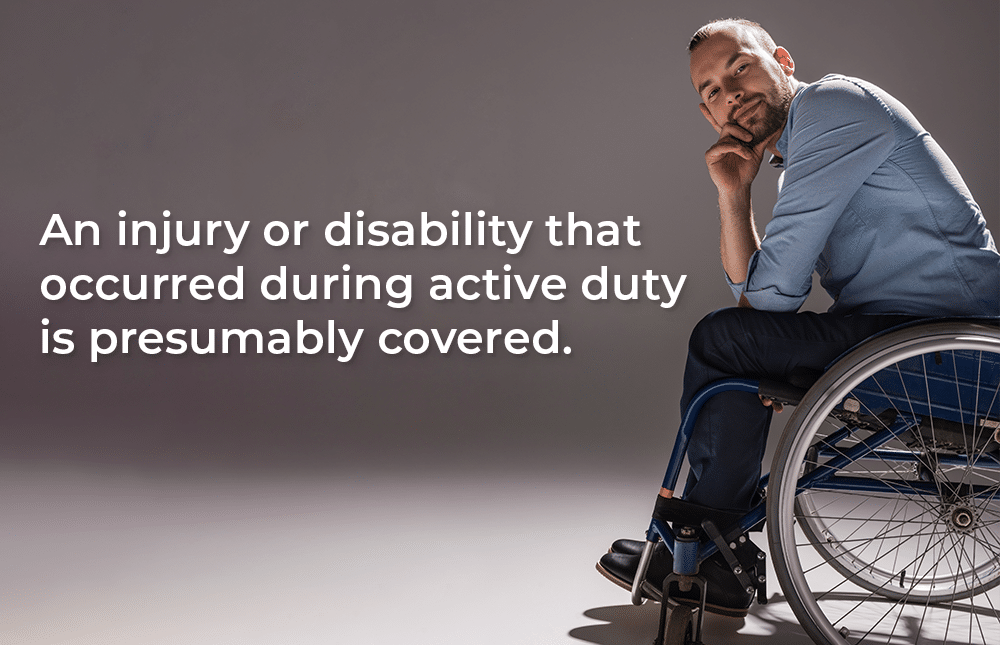VA Disability Benefits Eligibility: Do You Qualify?
The eligibility requirements for veterans disability benefits through the United States Department of Veterans Affairs can be confusing, as can the application process. There are several types of benefits that a veteran and/or their family members may be eligible for, including:
- Disability compensation benefits
- Special monthly compensation (SMC)
- Dependency and indemnity compensation (DIC) for surviving spouses, children, and dependent parents
Veterans may also be eligible for services like VA health care, education and career counseling, vocational rehabilitation, veterans insurance, home loans, and VA pension in addition to monthly payments. You can find the complete list of VA benefits on VA.gov.
It’s important to note that the Social Security Administration (SSA) offers disability compensation as well. While some veterans will qualify for both veterans’ disability and social security disability benefits, the application processes are separate. We will be discussing eligibility for veterans’ disability benefits through the VA in this blog post.
Basic Requirements for VA Disability Benefits
When disabled veterans apply for disability compensation through the U.S. Department of Veterans Affairs, they must meet three basic requirements:
- The individual must be a veteran.
- The veteran must have been diagnosed with a physical or mental health condition.
- The condition must have resulted from an in-service event.
This means that a veteran must have what the VA calls a “service-connected disability” to make a disability claim. Veterans will need to provide medical evidence that their condition is connected to service. Evidence can include medical records, statements from a health care provider, and lay statements from fellow service members, family members, and other individuals close to the veteran. The VA will then assess this evidence and award a disability rating, which determines the amount of compensation that the veteran will receive.
Presumptive Conditions
While most veterans will need to prove service connection when applying for VA disability benefits, there are some exceptions to this rule. The VA has establish that veterans with certain qualifications are eligible for presumptive disability benefits. These veterans include:
- Former prisoners of war who have a condition that’s at least 10% disabling
- Vietnam veterans who were exposed to Agent Orange or served in the Republic of Vietnam between Jan. 9, 1962 and May 7, 1975
-
Atomic veterans who were exposed to ionizing radiation and:
- Participated in atmospheric nuclear testing, OR;
- Occupied or were prisoners or war in Hiroshima or Nagasaki, OR;
- Served before Feb. 1, 1992 at a diffusion plant in Paducah, KY, Portsmouth, OH, or Oak Ridge, TN, OR;
- Served before Jan. 1, 1974 at Amchitka Island, AK
- Gulf War veterans who served in the Southwest Asia Theater or Operations and have a condition that’s at least 10% disabling by Dec. 31, 2021.
You can read more about presumptive disability on VA.gov.
However, obtaining disability benefits from the VA is not always straightforward. The veteran must show that his disabilities are connected to his military service before he can receive VA benefits. Before we can even look at whether a veteran’s disabilities are service connected, though, there are some threshold questions we have to consider to determine whether the veteran himself qualifies for compensation.
Veterans should consider these details before applying for VA disability compensation.

Discharge Status
One of the first questions we ask, to determine whether we can help a veteran, is what type of discharge the veteran had. The quality of the veteran’s discharge can disqualify him from receiving VA benefits whether or not his disabilities were caused by or began during service. In general, to receive VA benefits, the veteran must have received either an honorable discharge or a general discharge, sometimes also referred to as a discharge under honorable conditions. An honorable discharge indicates good to excellent service while a general discharge indicates satisfactory service –this may include a medical discharge or some minor misconduct.
Discharge Under Dishonorable Conditions
A veteran who receives a bad conduct discharge, a dishonorable discharge, or an other than honorable discharge, sometimes called undesirable discharge, may be barred from receiving any VA benefits. Is there anything that a veteran a can do about the quality of his discharge? Yes, the veteran may attempt to have his discharge upgraded if his specific circumstances warrant such an upgrade. Sometimes extenuating circumstances may excuse the behavior for which the veteran was discharged. In addition, the VA can review an other than honorable discharge and made an administrative decision as to whether the discharge is a bar to benefits.
In this context, it is important to know that a veteran who has multiple periods of service may have more than one type of discharge. For example, if a veteran served for two years and was honorably discharged but then re-enlisted and was dishonorably discharged, he may still qualify for benefits for a disability that was caused by or began during that first period of service.
Type of Military Duty
Another issue that must be determined prior to looking at the veteran’s disabilities is whether the veteran has the right type of duty to qualify for VA benefits. This issue is not much of a problem for veterans who had active duty in one of the major branches of service. An injury or disability that occurred during active military service is presumably covered, as is an injury that occurred during travel to or from active duty. Where this issue often arises is in the cases of National Guard or Reservists. These veterans can, however, qualify for VA benefits if they were injured or disabled during a period of active duty service for training or even inactive duty for training.

What Happens Next?
The VA disability claims process can be lengthy. In fact, the average claims process lasts about 125 days from the time the VA receives your application. And once you receive your VA disability rating, you may not agree with the result. This then launches a lengthy appeals process to obtain the benefits you deserve.
Once we have established that the veteran qualifies for benefits, then we can look at that veteran’s disabilities to see if they are service-connected. In making that determination, it is important to remember that for purposes of disability compensation, a service member’s workday never ends. Please know that whether you were actually injured while doing your job in the military or whether you were injured on your own time, you may still qualify for VA disability benefits, assuming you were not engaged in misconduct when you were injured. The VA considers your military duty as a full-time status.
Don’t assume that you are not entitled to benefits solely because the VA has told you that you are not.
Have Questions About Your Eligibility Status?
If you’re living with an injury or medical condition that resulted from your time in the armed forces, you may be eligible for VA disability benefits. The attorneys at Hill & Ponton are available to assess your eligibility status and represent you in your pursuit of benefits and compensation. Contact us today for a free case evaluation.




